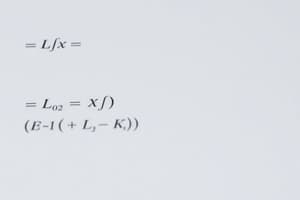Podcast
Questions and Answers
What is the main purpose of using derivatives in calculus?
What is the main purpose of using derivatives in calculus?
- Calculate instantaneous velocity and acceleration
- Determine maximum and minimum values of functions (correct)
- Find the area under a curve
- Approximate functions by polynomials
Which branch of physics uses calculus to calculate the instantaneous velocity and acceleration of an object?
Which branch of physics uses calculus to calculate the instantaneous velocity and acceleration of an object?
- Thermodynamics
- Kinematics (correct)
- Quantum mechanics
- Optics
What does the definite integral of a function over a specific interval represent?
What does the definite integral of a function over a specific interval represent?
- The instantaneous rate of change
- The maximum value of the function
- The signed area between the function and the x-axis (correct)
- The accumulation of values
In which field are integrals commonly used to calculate volumes and surface areas?
In which field are integrals commonly used to calculate volumes and surface areas?
What concept is crucial when determining whether a series converges or diverges in advanced calculus?
What concept is crucial when determining whether a series converges or diverges in advanced calculus?
How do the Taylor and Maclaurin series help in mathematical analysis?
How do the Taylor and Maclaurin series help in mathematical analysis?
What is the two-part discipline that constitutes calculus?
What is the two-part discipline that constitutes calculus?
Who independently developed the concepts and notation of calculus in the early 17th century?
Who independently developed the concepts and notation of calculus in the early 17th century?
What does the derivative of a function represent?
What does the derivative of a function represent?
What does the differential in calculus represent?
What does the differential in calculus represent?
What practical application does the derivative have in calculus?
What practical application does the derivative have in calculus?
In calculus, what is the rate of change of a function with respect to its input at a given point?
In calculus, what is the rate of change of a function with respect to its input at a given point?
Study Notes
Exploring Math: A Deep Dive into Calculus
Calculus, a subject that has evoked both awe and confusion since its inception, is a cornerstone in the vast world of mathematics. It's the study of the behavior of functions as they vary over small intervals, providing tools to analyze and find solutions to complex problems in fields ranging from physics and engineering to economics and the natural sciences.
Origins and Evolution
Calculus is a two-part discipline: differential calculus, which examines rates of change, and integral calculus, which deals with accumulation or summation of infinitesimal quantities. Leibniz and Newton, two of the most renowned mathematicians in history, independently developed the concepts and notation we still use today in the early 17th century.
Limits and Differentials
At the heart of calculus is the concept of the limit. As you approach a particular point on a function, what happens to its behavior? The derivative of a function, denoted by (f'(x)), is the rate of change of the function with respect to its input at a given point. On the other hand, the differential, denoted by (df), represents the infinitesimal change in the function.
Applications of Differential Calculus
The derivative has a variety of practical applications, including:
- Tangents and Slopes: The derivative of a function at a particular point gives the slope of the tangent line to the graph at that point.
- Optimization: The derivative is used to find the maximum and minimum values of functions.
- Velocity and Acceleration: In physics, calculus enables us to calculate the instantaneous velocity and acceleration of an object over time.
Integration and Antiderivatives
Integral calculus deals with finding the area under a curve and the accumulation of values. An antiderivative, or indefinite integral, of a function is another function whose derivative is the original function. The definite integral of a function over a specific interval represents the signed area between the function and the x-axis.
Applications of Integral Calculus
The integral has numerous practical applications, including:
- Volume and Surface Area: In geometry and physics, integrals are used to calculate the volumes and surface areas of various objects.
- Differential Equations: Solving differential equations often requires the use of integrals.
- Physics: Integrals are used in physics to calculate various quantities such as mass, work, and energy.
Convergence and Series
In advanced calculus, we study series, which are sums of infinitely many terms. Convergence is a crucial concept in this context, where we determine whether a series converges or diverges. The Taylor and Maclaurin series allow us to approximate functions by polynomials, an essential tool in mathematical analysis.
The Power of Calculus
Calculus is a profound, beautiful, and powerful subject that equips us with the tools to understand and analyze complex systems in our world. Its applications span diverse fields and constantly evolve as we seek to deepen our understanding of the universe. From the intricacies of the human heart to the cosmic complexities of our expanding universe, calculus informs our pursuit of mathematical truth and scientific discovery.
Studying That Suits You
Use AI to generate personalized quizzes and flashcards to suit your learning preferences.
Description
Delve into the fundamental principles of calculus, exploring topics such as limits, differentials, derivatives, integrals, series, and their practical applications in various scientific and mathematical fields. Learn about the historical origins of calculus with a focus on the contributions of Leibniz and Newton, and understand how calculus shapes our understanding of the world around us.




